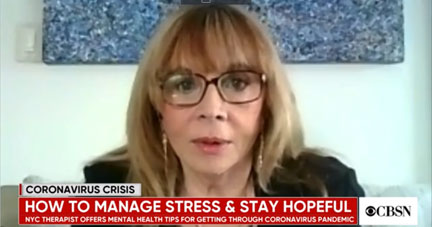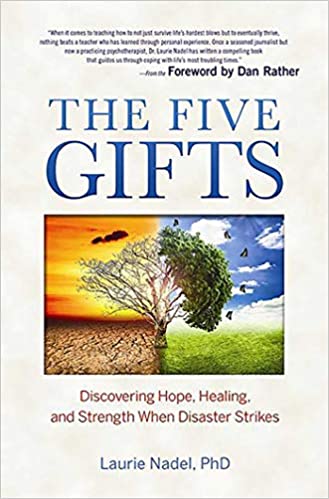Just a few days into Stress Awareness Month, 20 percent of Americans say COVID-19 is having “a major impact” on their mental health (Kaiser Family Foundation). “COVID-19 is a mental health emergency and we need psychological triage,” says acute trauma specialist Laurie Nadel, Ph.D., author of The Five Gifts: Discovering Healing, Hope and Strength When Disaster Strikes, available HERE.
“Just as no two people experience the physical symptoms of COVID-19 the same way, no two people will experience it the same way emotionally. While some will emerge with only minor scars, others will develop full-blown depression, PTSD, catastrophic grief, and some will have major anxiety or suicidal thoughts. We need to equip everyone with the tools they need to survive this emotionally.”
As a disaster stress expert on the front lines nationwide—including helping first responders after 9/11 and the students and teachers in Parkland, FL, after the horrific school shooting—Dr. Nadel’s “Emotional First Aid Tools” work in seconds to defuse panic and help calm the mind during traumatic events. “America as a culture is not prepared psychologically for the long process of dealing with the horror of facing off with life-and-death,” says Dr. Nadel, who adds that “trauma is not a bad hair day.”
“As civilians living in unstable times, we need to adopt new habits and mindsets; we need to learn from first responders as well as from other cultures how to stay calm and find our inner strength.” She adds: “You are not going crazy. You are a normal person having normal reactions to an abnormal situation.”
A seasoned TV and radio guest, she can share:
1. Lessons from first responders on how to handle acute stress
2. How COVID stress damages the immune system—and what to watch for
3. How to find your calm in this climate of fear and emotional first aid tools that work in seconds
4. 5 Minutes a Day for a positive mindset
5. Persevering through financial trauma—from an author who lost everything to Hurricane Sandy
6. How to spot the signs of PTSD (and what to do)
7. What we can learn from survivors of disasters around the globe
8. The Five Gifts that can help us persevere (Hint: humility, patience, empathy, forgiveness, and growth)
9. How to find silver linings so you can hold on to hope.
Laurie Nadel, PhD., is an expert on mental health and climate change. She has been interviewed in The New York Times, National Public Radio, Reuters, and CNN.com. A specialist in acute stress, she is a member of a critical incident stress management team working with first responders. After losing her home to Hurricane Sandy, Dr. Laurie ran long-term support groups for survivors and she directed a program for teenagers whose fathers were killed in the 9/11 World Trade Center attacks.

A journalist for twenty years, Laurie Nadel reported for Newsweek and United Press International in South America, wrote TV news for CBS, ABC News and Reuters Television, and was a religion columnist for The New York Times’ Long Island section. She also helped create the Committee to Protect Journalists, an organization which since 1981 has fought for the rights of journalists around the world. Please visit: www.laurienadel.com or drlaurienadel@msn.com.
THE FIVE GIFTS: Discovering Healing, Hope and Strength When Disaster Strikes: Available HERE.

Also on Coast to Coast
-
A Cup A Day: Managing Diabetes One Beverage at a Time
-
Exploring the Greens: Coast to Coast Takes On the Galleri Classic
-
Episode 27 of Coast to Coast: Checking out the Galleri Classic & Summer Travel Inspiration with Dalia Colón!
-
Coast to Coast Kicks Back at GBK Brand Bar’s Pre-Oscar Luxury Lounge
-
Coast to Coast Checks Out the Best of Sprouts with Nutritionist Cara Harbstreet
